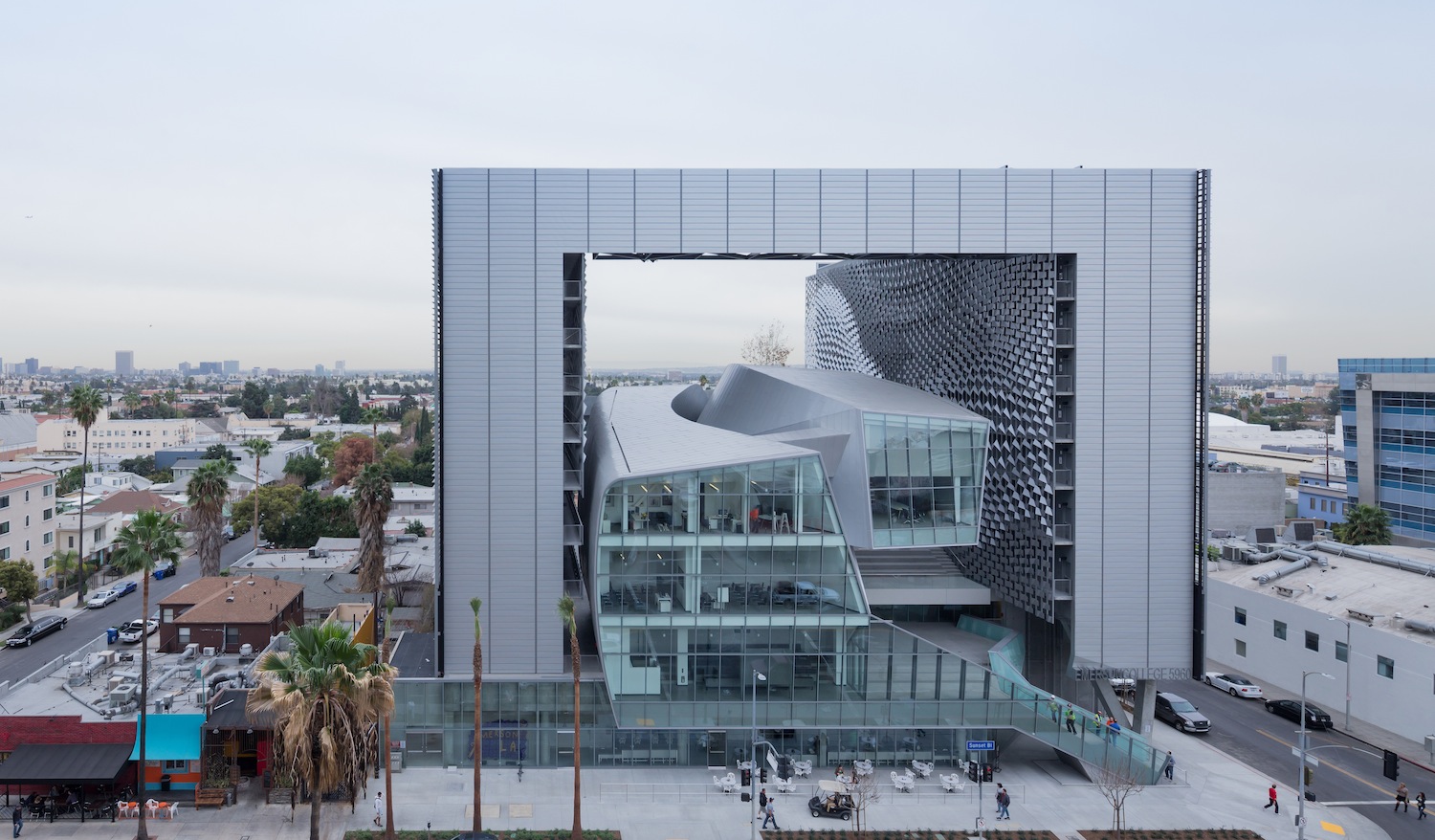Larry David, Maria Menounos, and Sofia Vergara are among the Hollywood elites scheduled to attend a star-studded gala March 8 to celebrate the opening of Emerson College's new $85 million Los Angeles campus building.
Located on Sunset Boulevard, in the heart of LA's entertainment and communications industry, the 10-story, 107,000-sf multipurpose campus can house up to 217 students and includes wired classrooms, an open-air screening and live-performance space, a Dolby Surround 7.1 audio post-production suite, a 4K screening room, computer labs, mixing suites, and a planned green screen motion capture stage.
Design architect Thom Mayne of Morphosis said the building's form, which takes the shape of a massive, shimmering aircraft hangar, housing a sculptural, glass-and-aluminum base building, is designed to "expand the interactive, social aspect of education. We focused on creating with the broader community in mind—both in terms of public space and sustainable design.”
The building’s exterior features a dynamic sun shading system that adapts to changing weather conditions to maintain optimal indoor temperature and natural light levels. Heating and cooling of the building is further optimized through an innovative passive valence system developed by Buro Happold.
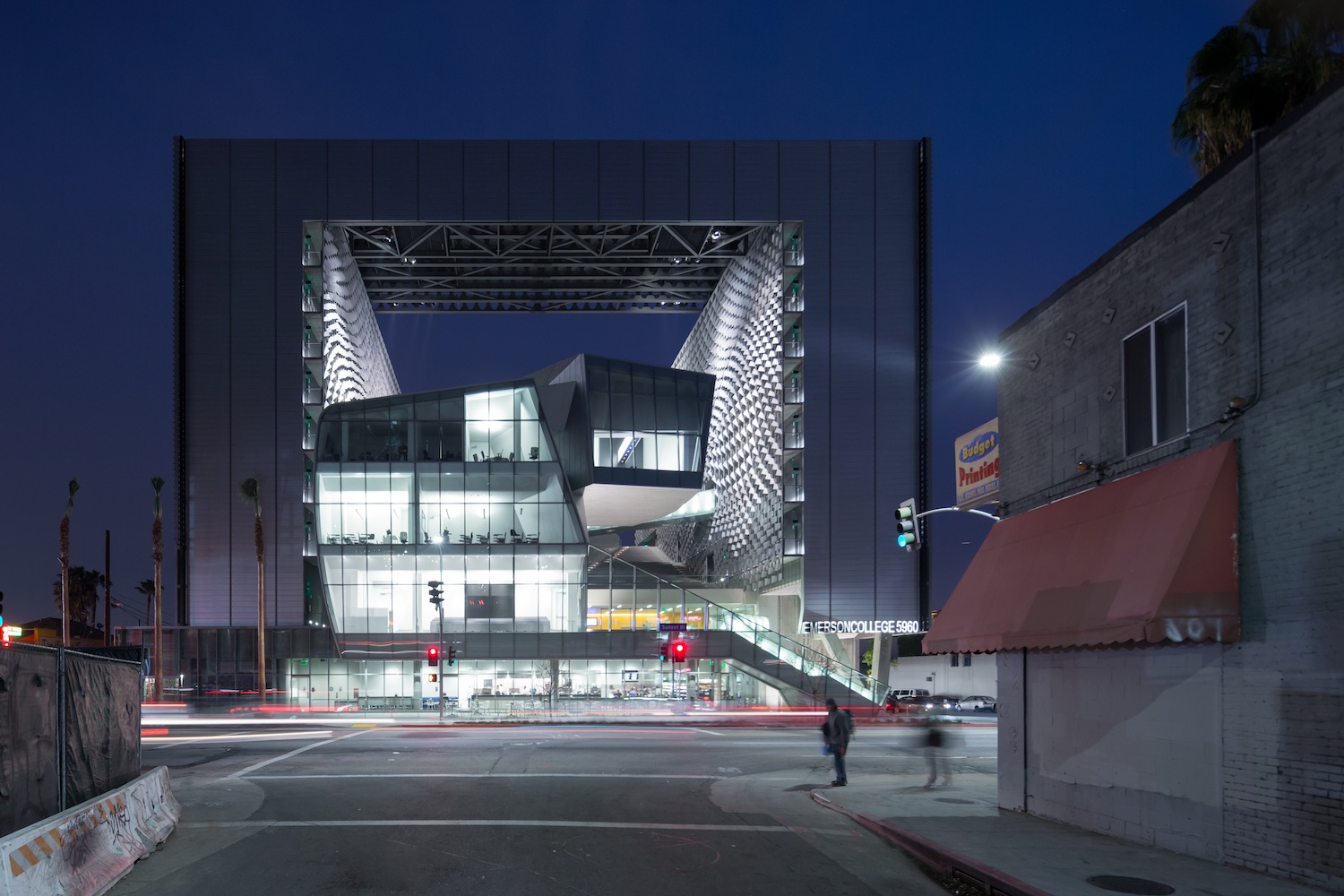
Photo: Iwan Baan - www.iwan.com / Courtesy Emerson College
Additional green design initiatives include: the use of recycled and rapidly renewable building materials; installation of efficient water-saving fixtures; a high-performance glass curtain-wall to minimize heat gain; landscaping and a living green wall; and a central management infrastructure to monitor overall building efficiency.
Morphosis' design statement:
Bringing student housing, instructional facilities, and administrative offices to one location, ELA condenses the diversity of a college campus into an urban site. Evoking the concentrated energy of East-Coast metropolitan centers in an iconic Los Angeles setting, a rich dialogue emerges between students’ educational background and their professional futures.
Fundamental to the Emerson Los Angeles experience, student living circumstances give structure to the overall building. Housing up to 217 students, the domestic zones frame a dynamic core dedicated to creativity, learning, and social interaction. Composed of two slender residential towers connected by a helistop, the 10-story square frame encloses a central open volume to create a flexible outdoor “room.”
A sculpted form housing classrooms and administrative offices weaves through the void, defining multi-level terraces and active interstitial spaces that foster informal social activity and creative cross-pollination. Looking out onto the multi-level terrace, exterior corridors to student suites and common rooms are shaded by an undulating, textured metal scrim spanning the full height of the towers’ interior face.
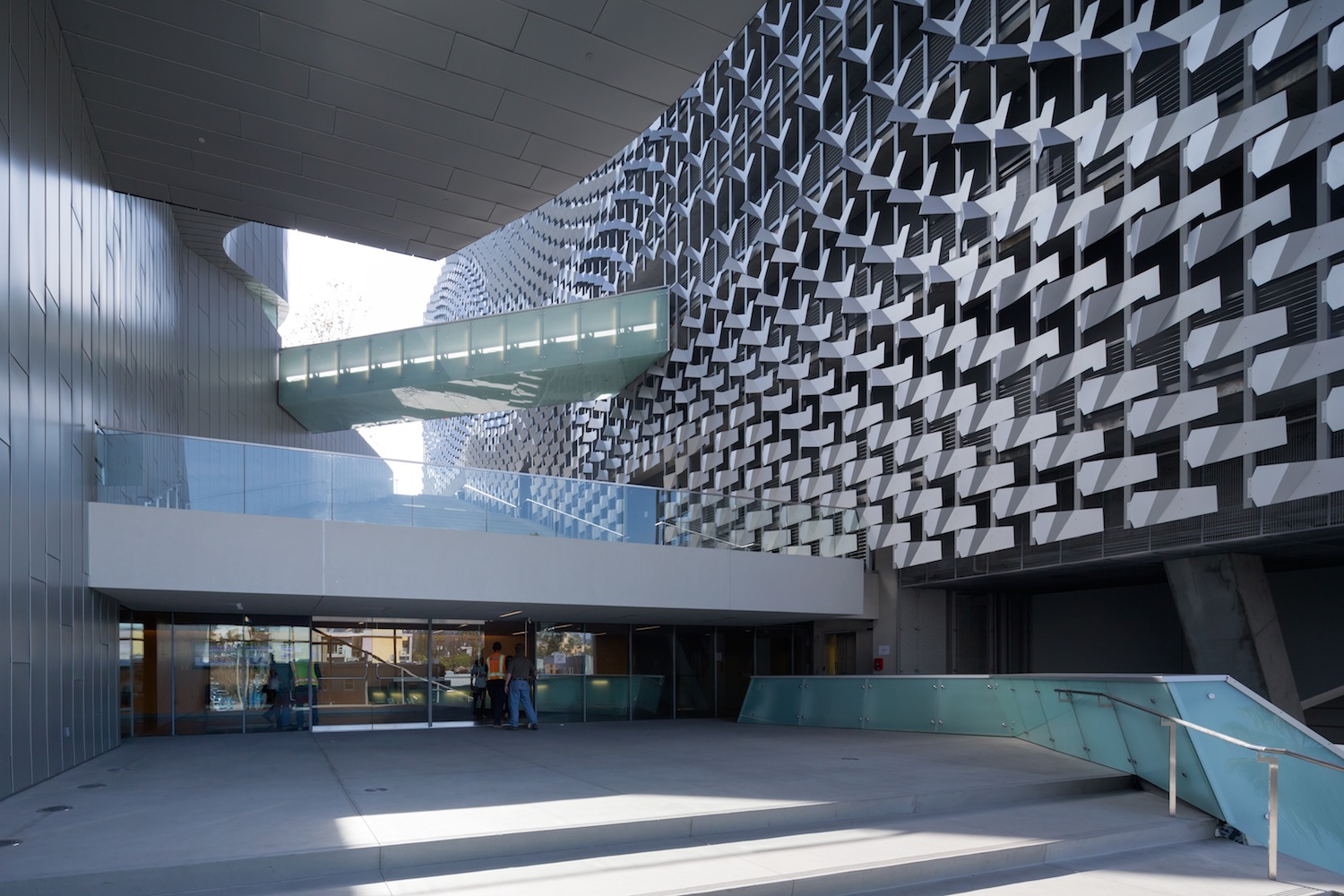
Photo: Iwan Baan - www.iwan.com / Courtesy Emerson College
Looking to the local context, the center finds a provocative precedent in the interiority of Hollywood film studios, where outwardly regular façades house flexible, fantastical spaces within. With rigging for screens, media connections, sound, and lighting incorporated into the façade’s metal framework, this dynamic visual backdrop also serves as a flexible armature for outdoor performances. The entire building becomes a stage set for student films, screenings, and industry events, with the Hollywood sign, the city of Los Angeles, and the Pacific Ocean in the distance providing added scenery.
Anticipated to achieve a LEED Gold rating, the new center champions Emerson’s commitment to both sustainable design and community responsibility. Wrapping the building’s northwest corner, a green wall underscores the towers’ actively changing exterior skin. Connected to weather stations that track the local climate, temperature, and sun angle, the automated sunshade system opens and closes horizontal fins outside the high-performance glass curtain-wall to minimize heat gain while maximizing daylight and views.
Further green initiatives include the use of recycled and rapidly renewable building materials, installation of efficient fixtures to reduce water use by 40%, energy savings in heating and cooling through a passive valence system, and a building management and commissioning infrastructure to monitor and optimize efficiency of all systems.
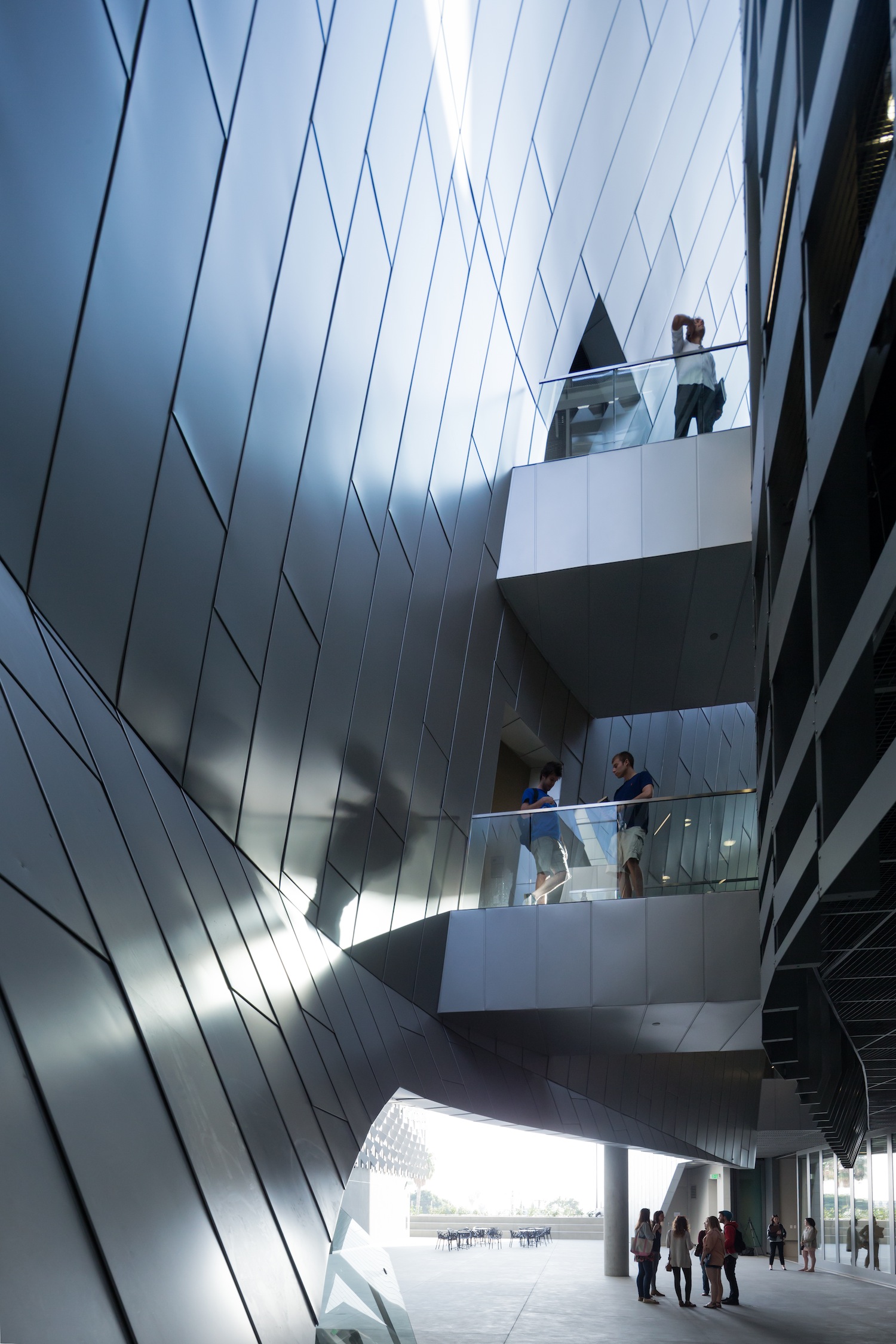
Photo: Iwan Baan - www.iwan.com / Courtesy Emerson College
Building Team
Architect: Morphosis Architects (Thom Mayne)
Structural engineer: John A. Martin Associates, Inc.
MEP engineer: Buro Happold
General contractor: Hathaway Dinwiddie Construction Company
Development consultant: Robert Silverman
Civil engineer: KPFF
IT/BIM implementation: Synthesis
Lighting consultant: Horton Lees Brogden Lighting Design, Inc.
Specifications: Technical Resources Consultants, Inc.
Theater consultant: Auerbach Pollock Friedlander
Acoustic consultant: Newson Brown Associates LLC
Audiovisual/IT consultant: Waveguide Consulting Inc.
Code/life safety consultant: Arup
Facade consultant: A. Zahner Architectural Metals; JA Weir Associates
Cost consultant: Davis Langdon
Vertical transportation: Edgett Williams Consulting Group, Inc.
Curtain wall consultant: Walters & Wolf
LEED consultant: Davis Langdon
Graphics: Follis Design
Waterproofing consultant: Independent Roofing Consultants
Geotechnical consultant: Geotechnologies Inc.
Sustainability: Davis Langdon
Landscape consultant: Katherine Spitz Associates
Architectural specifications consultant: Technical Resources Consultants, Inc.
Architectural visualization: Kilograph
Smoke control: Exponent
Exterior building maintenance: Olympique
Project Information
Cost: $85 million
Total size: 107,000 sf (70,500 sf residential; 30,100 sf instructional/administrative; 6,400 sf retail for Emerson kitchen)
Lot size: 37,351 sf
Building height: 130 feet; 10 stories
Parking: three levels of subterranean parking with 239 parking spaces
Housing: capacity for 217 students: 159 single rooms (eight are designated for resident assistants), 29 double rooms, and four faculty/staff apartments
Instructional spaces: six general purpose classrooms; computer lab; editing lab; audio lab; distance learning room; two performance studios; two dressing rooms; two study rooms; 4K screening room; large assembly room; audio post mixing suite
For more information, read Emerson's article on the Emerson LA grand opening and the LA Times report.
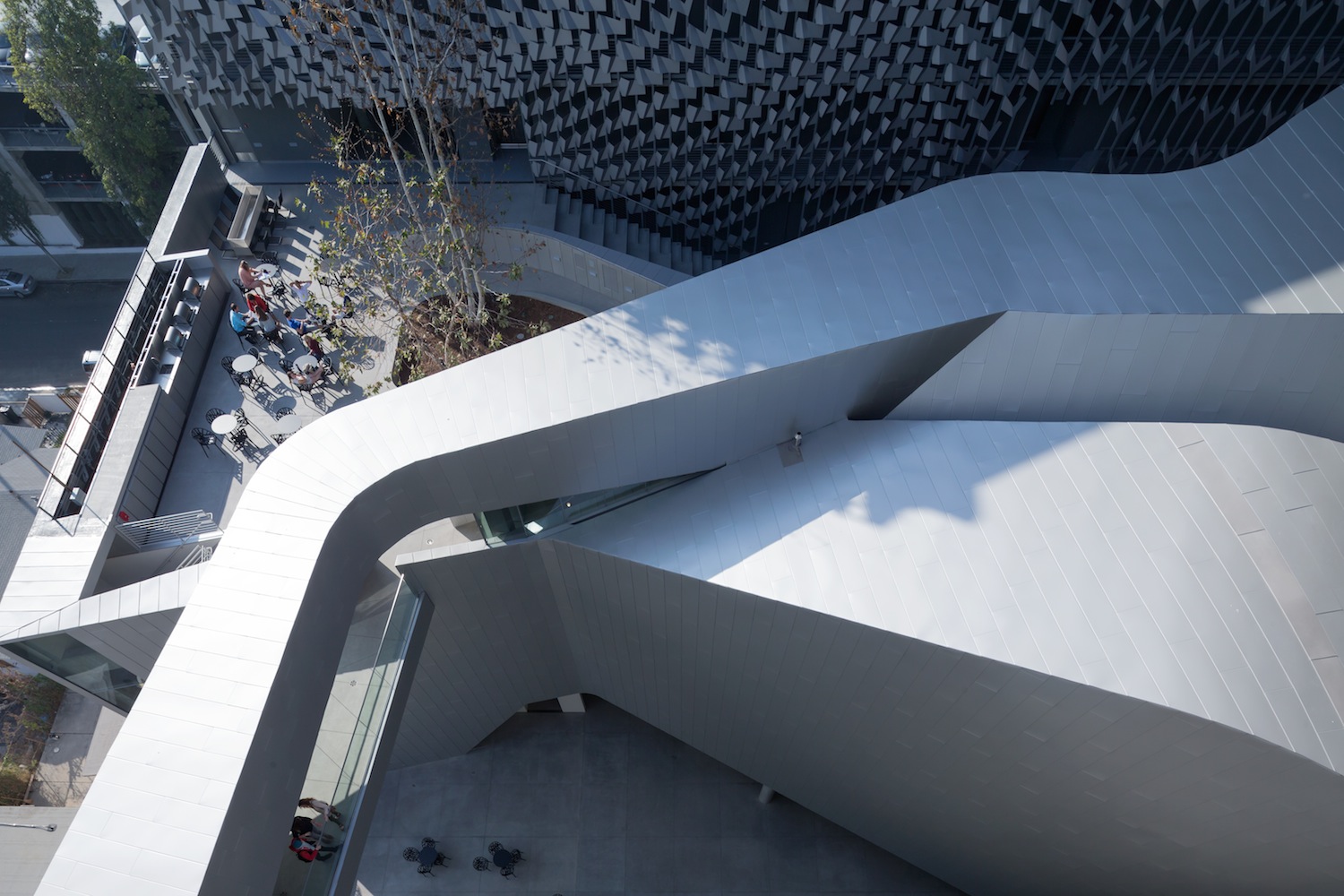
Photo: Iwan Baan - www.iwan.com / Courtesy Emerson College
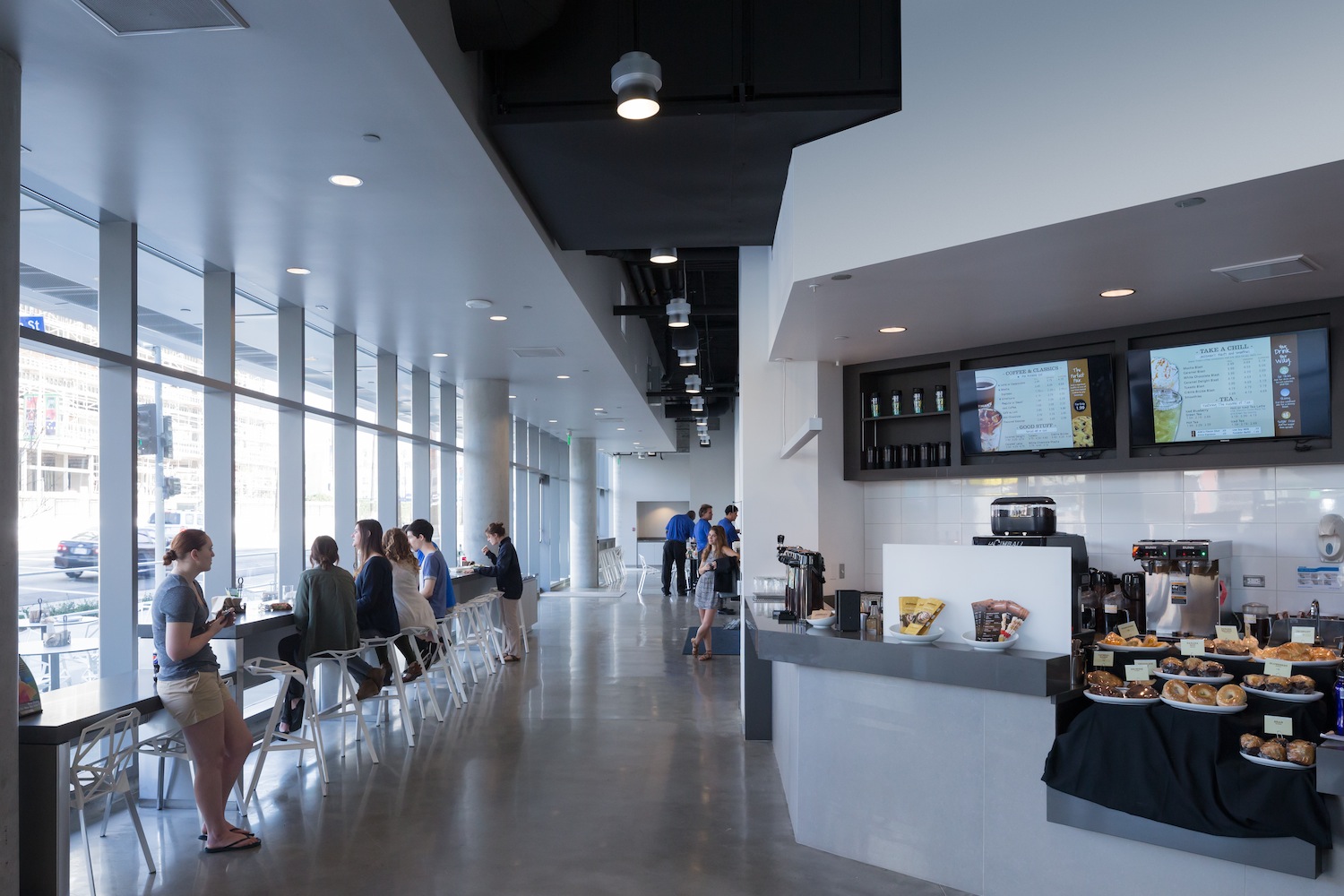
Photo: Iwan Baan - www.iwan.com / Courtesy Emerson College
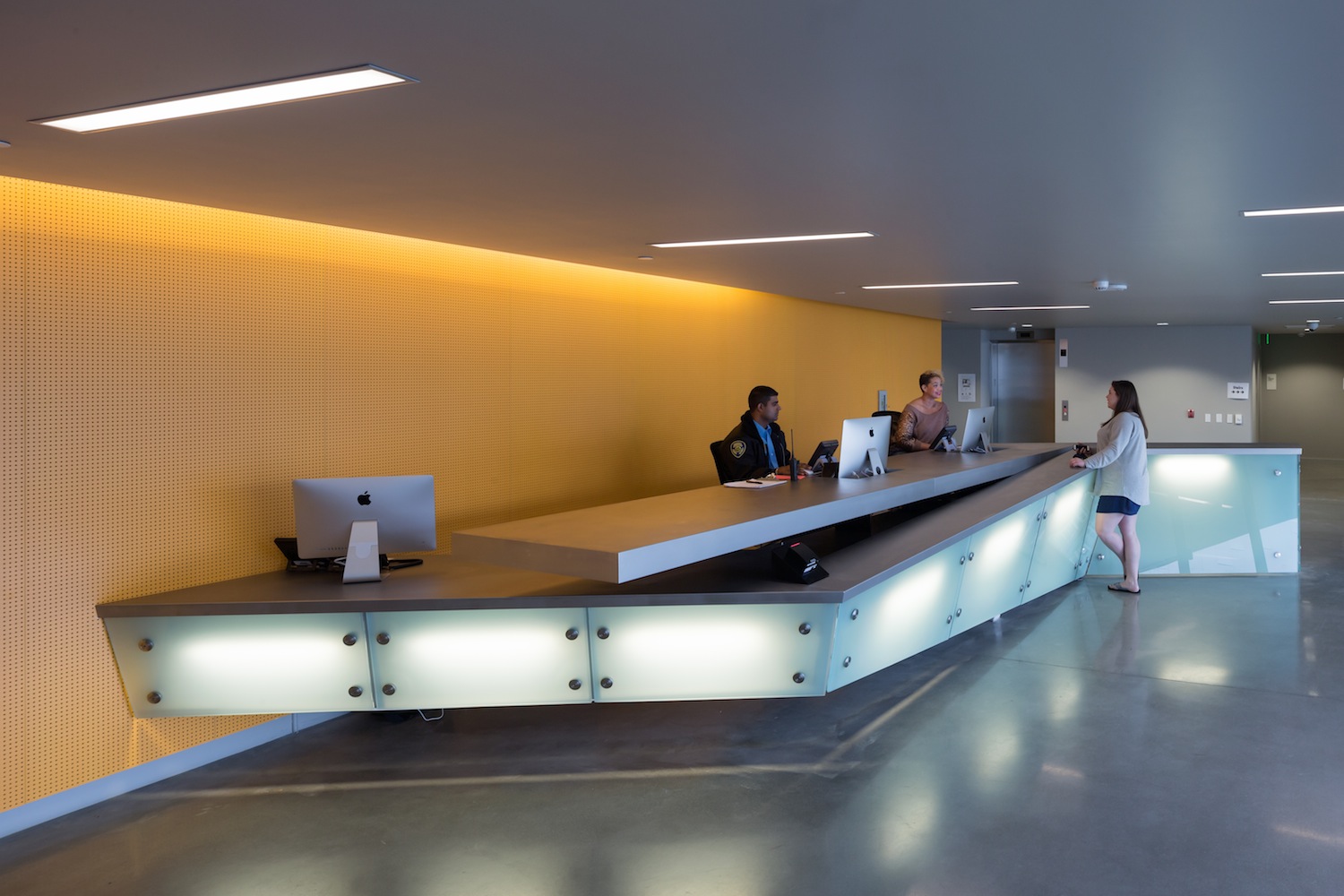
Photo: Iwan Baan - www.iwan.com / Courtesy Emerson College
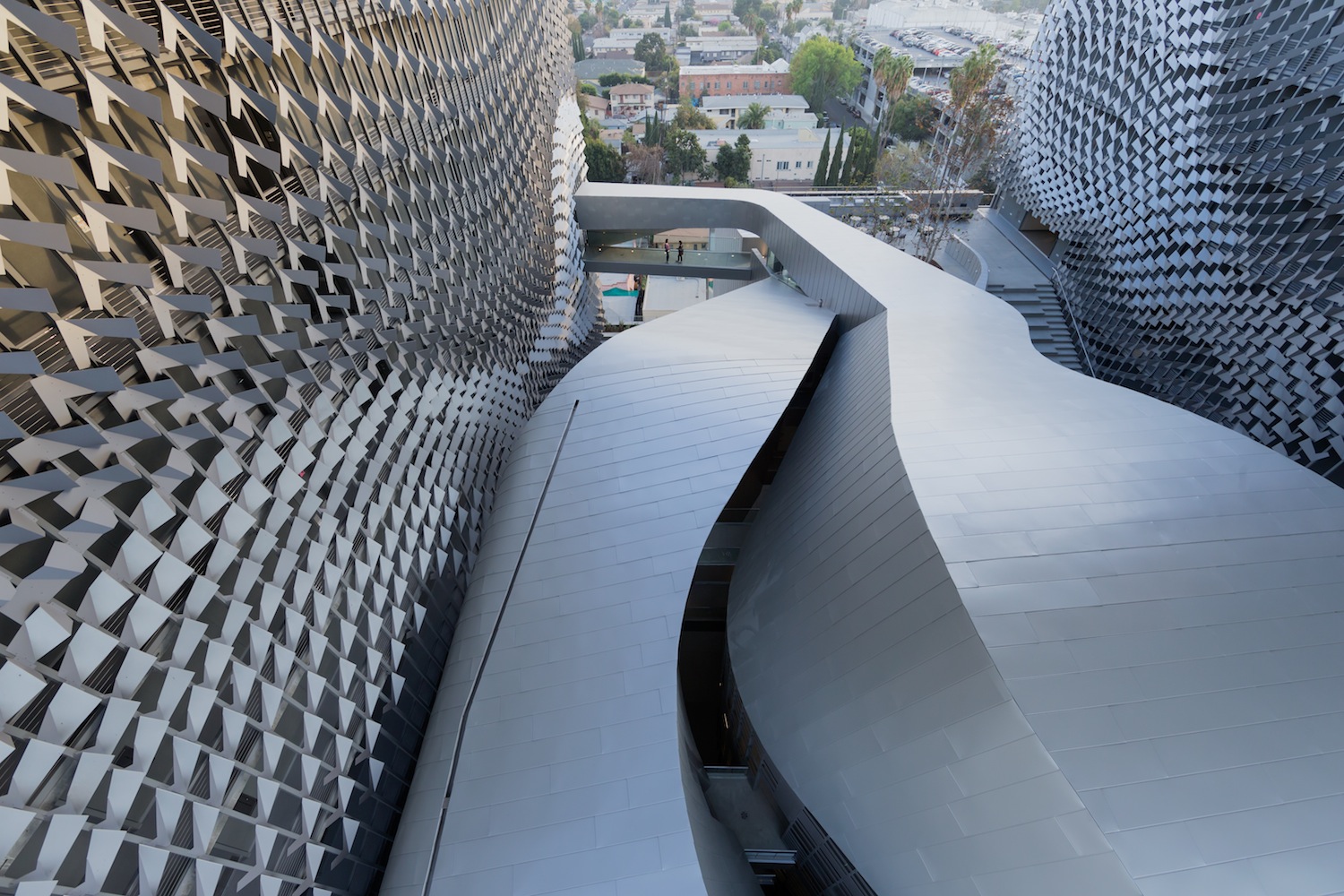
Photo: Iwan Baan - www.iwan.com / Courtesy Emerson College
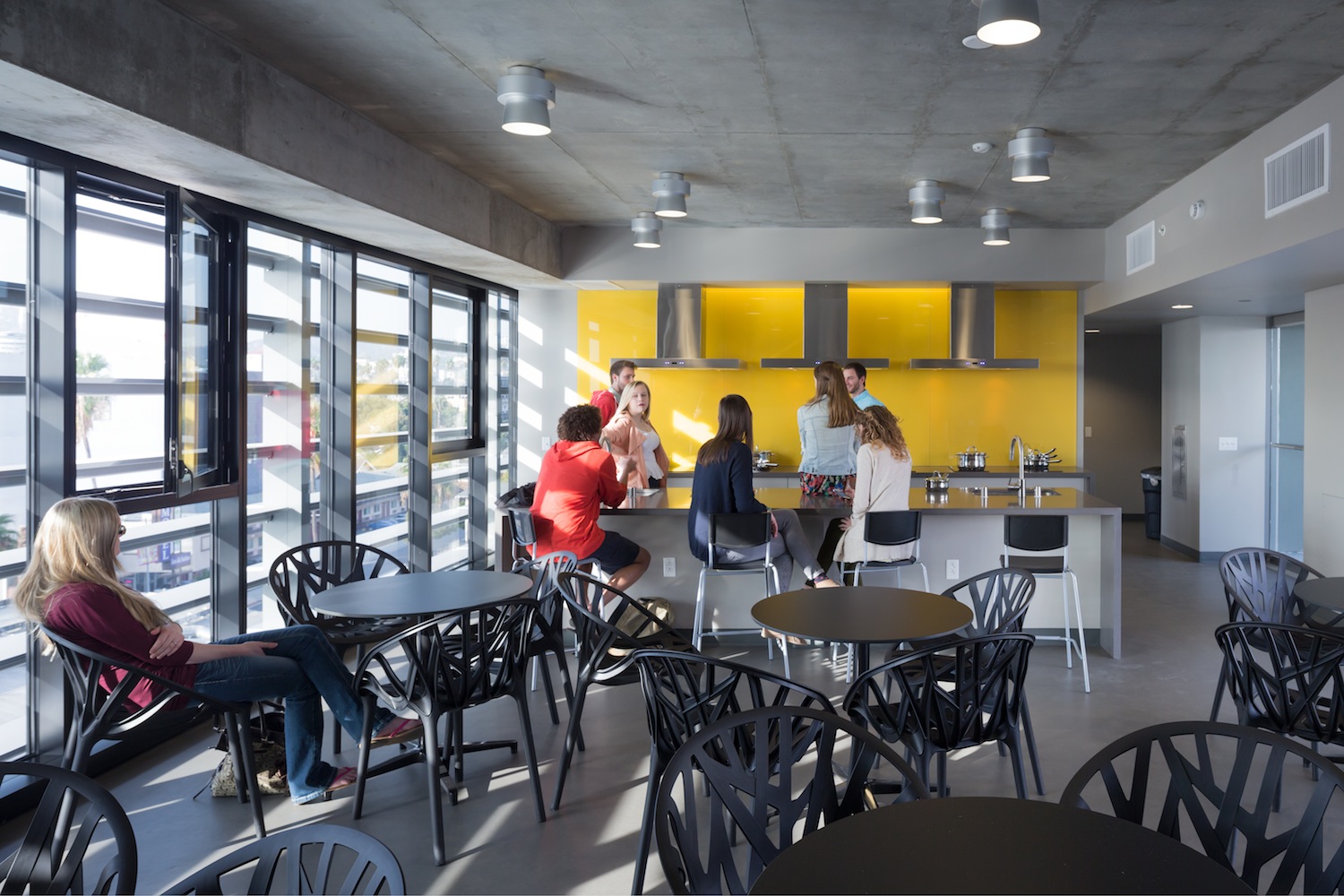
Photo: Iwan Baan - www.iwan.com / Courtesy Emerson College
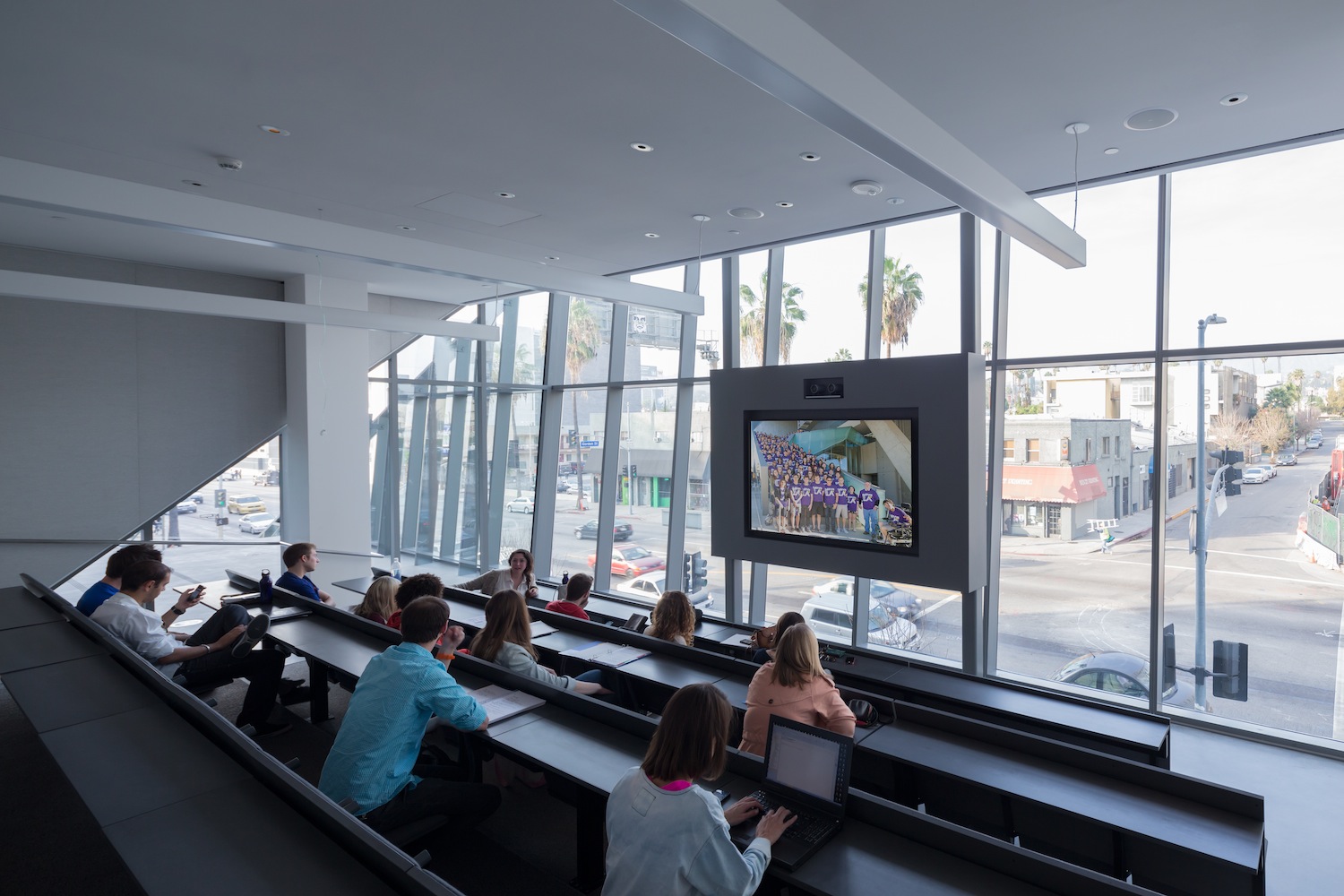
Photo: Iwan Baan - www.iwan.com / Courtesy Emerson College
Related Stories
| Aug 11, 2010
USGBC honors Brad Pitt's Make It Right New Orleans as the ‘largest and greenest single-family community in the world’
U.S. Green Building Council President, CEO and Founding Chair Rick Fedrizzi today declared that the neighborhood being built by Make It Right New Orleans, the post-Katrina housing initiative launched by actor Brad Pitt, is the “largest and greenest community of single-family homes in the world” at the annual Clinton Global Initiative meeting in New York.
| Aug 11, 2010
AIA report estimates up to 270,000 construction industry jobs could be created if the American Clean Energy Security Act is passed
With the encouragement of Senate majority leader Harry Reid (D-NV), the American Institute of Architects (AIA) conducted a study to determine how many jobs in the design and construction industry could be created if the American Clean Energy Security Act (H.R. 2454; also known as the Waxman-Markey Bill) is enacted.
| Aug 11, 2010
Architect Michael Graves to be inducted into the N.J. Hall of Fame
Architect Michael Graves of Princeton, N.J., being inducted into the N.J. Hall of Fame.
| Aug 11, 2010
Modest rebound in Architecture Billings Index
Following a drop of nearly three points, the Architecture Billings Index (ABI) nudged up almost two points in February. As a leading economic indicator of construction activity, the ABI reflects the approximate nine to twelve month lag time between architecture billings and construction spending.
| Aug 11, 2010
Architecture firms NBBJ and Chan Krieger Sieniewicz announce merger
NBBJ, a global architecture and design firm, and Chan Krieger Sieniewicz, internationally-known for urban design and architecture excellence, announced a merger of the two firms.
| Aug 11, 2010
Nation's first set of green building model codes and standards announced
The International Code Council (ICC), the American Society of Heating, Refrigerating and Air Conditioning Engineers (ASHRAE), the U.S. Green Building Council (USGBC), and the Illuminating Engineering Society of North America (IES) announce the launch of the International Green Construction Code (IGCC), representing the merger of two national efforts to develop adoptable and enforceable green building codes.
| Aug 11, 2010
David Rockwell unveils set for upcoming Oscar show
The Academy of Motion Picture Arts and Sciences and 82nd Academy Awards® production designer David Rockwell unveiled the set for the upcoming Oscar show.
| Aug 11, 2010
More construction firms likely to perform stimulus-funded work in 2010 as funding expands beyond transportation programs
Stimulus funded infrastructure projects are saving and creating more direct construction jobs than initially estimated, according to a new analysis of federal data released today by the Associated General Contractors of America. The analysis also found that more contractors are likely to perform stimulus funded work this year as work starts on many of the non-transportation projects funded in the initial package.


